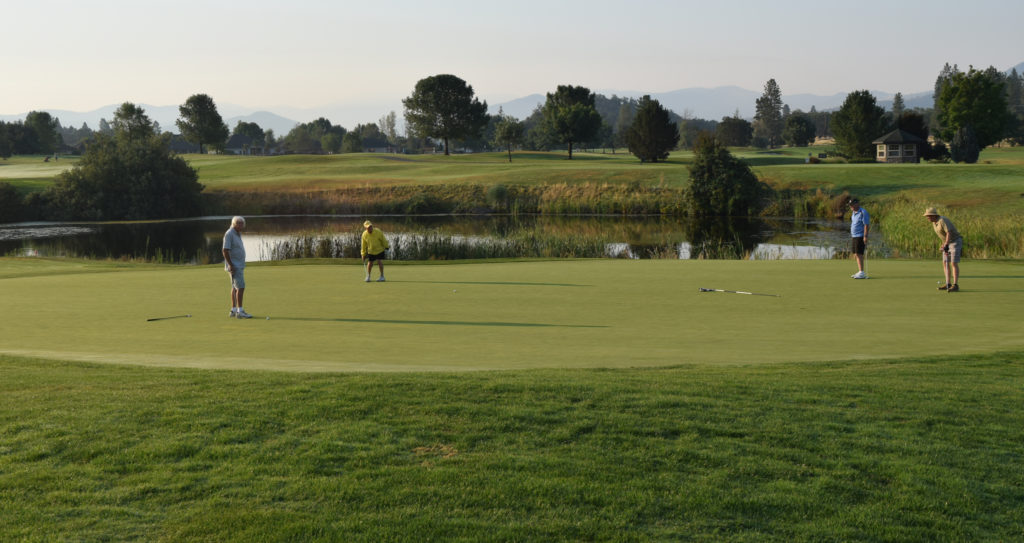The Resort at Eagle Point: A golf course becomes a destination
Owner Bob Hyer’s decision to add lodging makes a place to play also a place to stay
EAGLE POINT — It seems that Bob Hyer has always had good business instincts.
When he was 6 he went around his modest southern California neighborhood shining shoes for 10 cents, and a few years later, when he saw more money in a paper route, he sold — sold! — the shoe-shining business, including supplies and client list, to another kid for $5.
When he was in his 20s, after a six-year stint in the U.S. Air Force, he was shoeing horses and met some young riders on the rodeo circuit. He’d always enjoyed photography, and so he followed the rodeos, taking action photos with black-and-white film, developing and printing them himself and selling 8-by-10s to the cowboys who clamored for them.
Maybe it was another kind of instinct that suggested to Hyer that a job on a SWAT team for the corrections department in Washington state wasn’t the future he wanted, after being stuck in the neck with a shiv in a prison disturbance.
And when he got into financial planning in his 30s he had the drive and the personality and business sense to make real money, eventually enough to afford to purchase Eagle Point Golf Course, with its pro shop and Talon Grill restaurant, four years ago, at age 58.
Then, at a time when golf courses were in trouble — and a bank owned Eagle Point, 10 miles east of Medford, acquiring it in lieu of foreclosure — Hyer’s business instincts and research told him that he could succeed at this Robert Trent Jones Jr.-designed course while indulging his passion for the sport.
Now, Hyer has put his business sense to the test again.
In a $1.3 million investment, Hyer and his wife, Chana, have built three chalets at Eagle Point that provide 12 rooms overlooking the No. 9 green and the practice range. It’s the first phase of what could be a four-phase project adding a total of 44 rooms. With the opening of the chalets in late July, the Hyers have renamed the facility The Resort at Eagle Point.
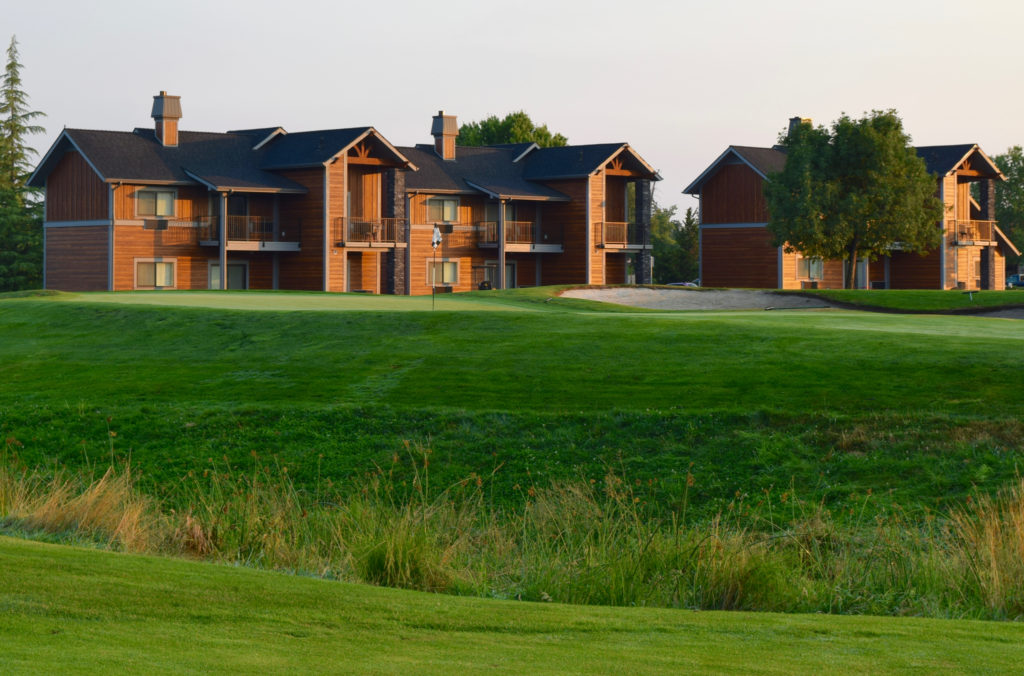
No longer simply a golf course, now they offer a destination.
Because while the principal market for the on-site lodging consists of golfers making the drive from Eugene and Bend and points beyond, in all directions, Hyer’s research told him that the room would fill a void in the Eagle Point community on a number of levels. Already, the facility was hosting functions ranging from weddings to celebrations of life, and local neighbors complained about lack of nearby lodging for visitors, and Hyer saw a secondary market in the anglers and whitewater rafters on the nearby Rogue River, or tourists en route to Crater Lake to the east, or couples combining golf with the Shakespeare Festival in Ashland to the south.
“Right now, what we have is a great little venue to create that destination resort,” Hyer said. “Having the lodging, having the restaurant, having the event center, all of those make it a viable place for people to come and stay.”
The lure of RTJ Jr.
Five years ago, Bob Hyer, who plays to a 2.2 handicap, wasn’t dreaming of owning a golf course, as much as he’d come to love the game after taking it up in his late 20s. (Hyer’s never-too-old philosophy includes learning to play the guitar in his 50s.)
He owned part of a financial planning business, Mosaic Financial Group, he’d established in 1994, and he and Chana were settled in Vancouver, Wash. Their retirement was going to be focused on Lac de’ Fleur Gardens, north of Vancouver, a venue for weddings, retreats and other functions she’d created with her expertise in landscaping, horticulture and design.
But in early 2012 a friend told Hyer about this golf course for sale in southern Oregon, and he went to Medford the next day. Designed by Robert Trent Jones Jr., Eagle Point opened in 1996, and Jones owned it himself until 2000; the subsequent owner turned it over to PremierWest Bank in January 2012 in lieu of foreclosure.
When Hyer learned the architect of the course in question, his interest intensified.
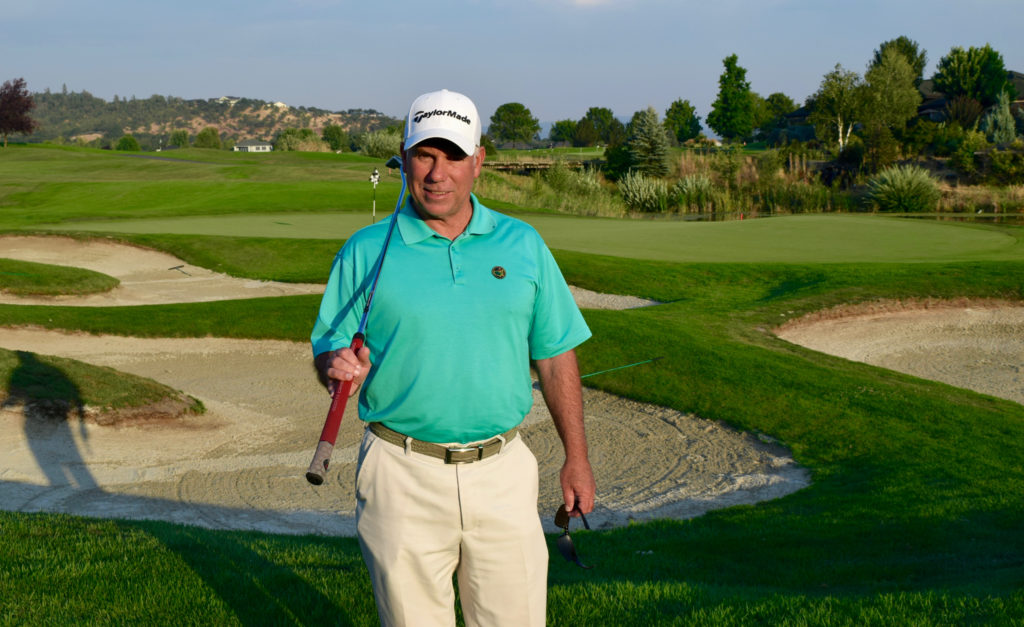
“The first time I got to play one of his courses, there was something different about it, the way fit everything into the land,” Hyer said. “When I went someplace, I looked for a Robert Trent Jones Jr. course.
“When I found out that this was one of his courses, I said ‘I wonder what the price would be, if I could make it a viable business.’ I was close to wanting to retire. So the timing was right, I thought I could buy it for the right price, turn it around, make it a viable business, come down here, live on the course and live out the ultimate golfer’s dream.”
After several visits, Hyer brought a dubious Chana to see the place. She was reluctant to leave Vancouver and Lac de’ Fleur, but what she saw was a blank canvas for her landscaping and design skills, now on display in the flower gardens and the chalets.
In July 2013, Hyer finally and officially took ownership of Eagle Point; he doesn’t disclose the purchase price. On the same day he was at Chambers Bay near Tacoma, for a chance to meet Jones personally at the U.S. Open site he designed there. The two have become friends, Jones pleased with Hyer’s enthusiasm for Eagle Point.
“He used to call it his orphan baby,” Hyer said. “He’s thrilled with what we’ve been able to do to take care of it, and turn it around.”
And so Jones has traveled to Medford to play in a benefit for the Eagle Point High School golf teams, and invited Hyer to join him at such courses as Cypress Point and Poppy Hills in California. Once, while Hyer was on the Eagle Point course in a driving rain, Jones happened to phone from Ireland, from his now-just-opened Hog’s Head Golf Club in Waterville, and was thrilled to hear how well Eagle Point was continuing to drain in the rain, a selling point for winter golfers, given the $1.2 million worth of sand he put down when he built it.
One day, Jones asked about a totem pole he’d installed at Eagle Point, a gift from a friend for designing a nine-hole course in Canada. It was worn and tattered, and when Hyer heard the backstory he had it repainted and restored.
“It became a symbol of the rejuvenation of the course,” he said.
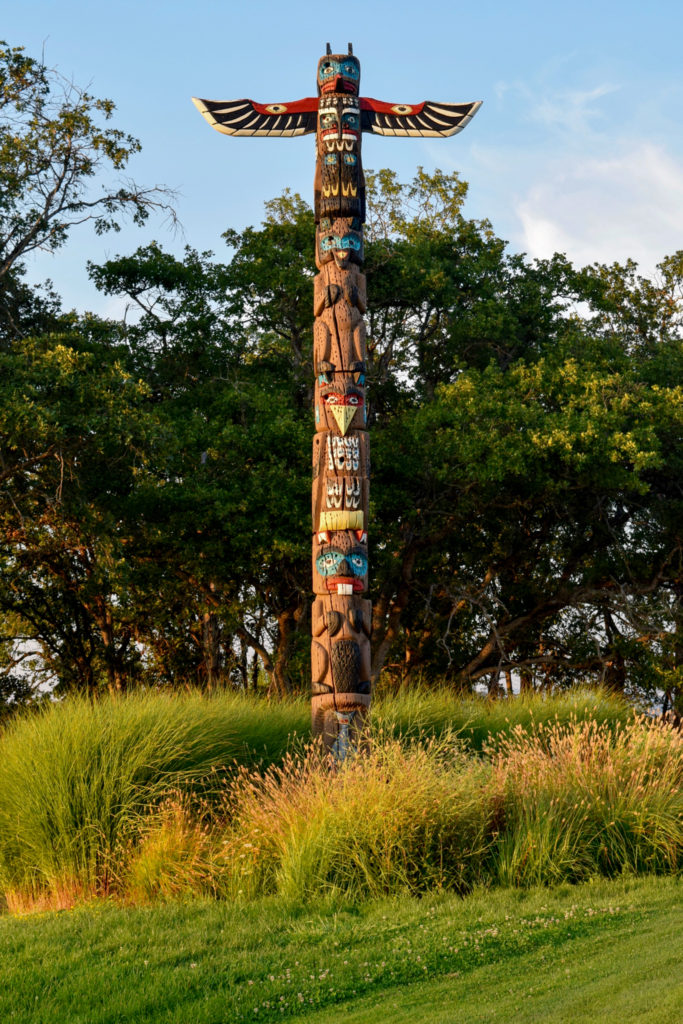
Attention to detail
The Hyers, who sold their businesses and moved to Eagle Point, live in a home overlooking the 17th tee. In his golf cart, Bob Hyer can be at the first tee in “1.7 minutes,” and he plays several times a week, his golf game reflecting his business approach, in that while he carefully assesses each shot, he’s not afraid to take dead aim at a tough pin position under the right circumstances with an eagle or birdie as a reward.
“There are a lot of correlations to business,” he said. “When I was doing my due diligence (about buying the course), there were a lot of potential risks, but I looked at it that if I could get it at the right people, and keep the people that I wanted, that I could mitigate the risk and that the reward would be a lot bigger, so it was worth taking the risk.”
In one sense, he hasn’t made sweeping changes. Improving the restaurant has been one focus, but Hyer still relies on the same management company, Touchstone Golf; the same head professional and general manager, Patrick Oropallo; and the same superintendent, Dave Stevens. The facility employs 65 people in peak season.
“I’ve got a great crew,” he said. “Because I don’t know what I don’t know.”
But he’s given Stevens better equipment to get the job done, putting profits back into the course, trucking in white sand from Idaho to keep the bunkers replenished. He’s had the rough trimmed, to make the course more playable and worked to extend the hours for play and maintenance.
When he bought Eagle Point, the course had 157 members; now it has 330.
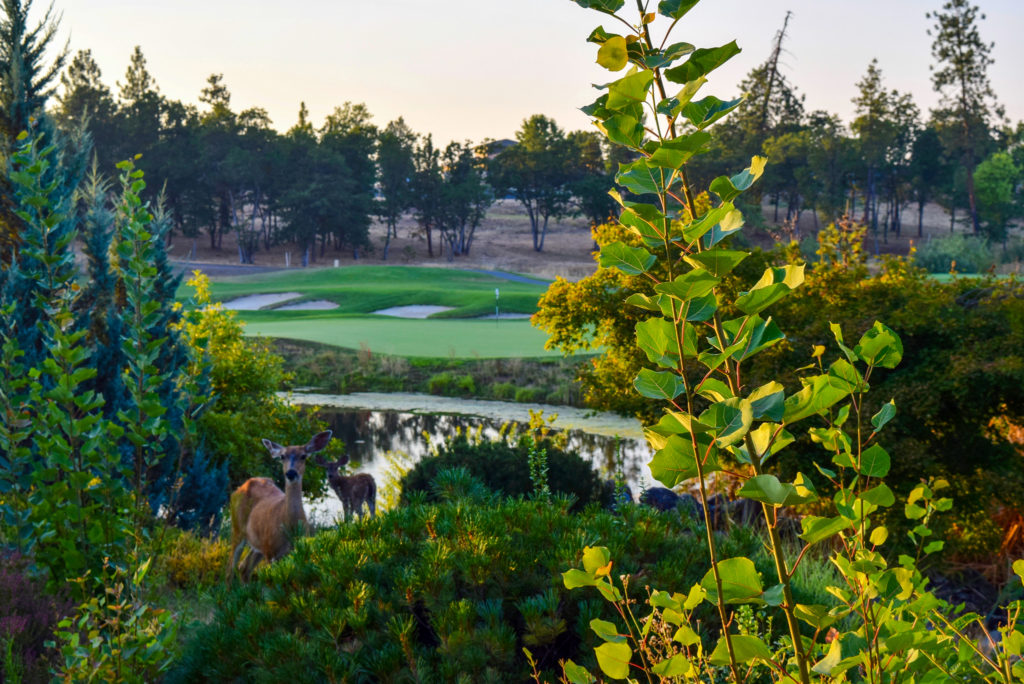
“When I did my due diligence, I could see it was a great course,” Hyer said. “It wasn’t in that bad a shape. It was 20 years old, so I could see some deferred maintenance coming about. But I knew I could speak the golf language. …
“We turned it around and have been profitable, and I’ve been putting all the profits back into the course.”
One of three public 18-hole courses in the Medford area — the others are Centennial and Stone Ridge — Eagle Point has six sets of tees, playing from 5,071 yards to 7,099, at a par of 72. There are houses on much of the course, but wildlife abounds, and on clear days Mount McLoughlin looms in the distance. The course’s signature hole is No. 16, a par 5 that has received accolades as the best hole in the Rogue Valley, playing as long as 591 yards and forcing the golfer to contend with bunkers left and water right on the approach to the green.
Weekday green fees are $47 walking, or $60 with a cart; weekend fees are $55 and $68, and there are various afternoon and twilight rates. Hyer personally determined the rates for the chalets, to keep them competitive with hotel rates in Medford. Cost of a studio room is $149 per night, a two-room suite is $199, and a studio and suite can be connected for $329.
Hyer said he wanted to “start small” with lodging, but early response has been so encouraging that the next phase could consist of a 24-room lodge with a lobby that would include another room for events. Another possibility is a four-bedroom rental home that could accommodate groups as large as 16.
Hyer’s version of “due diligence” and his business instincts will tell him when the time is right to take the risk. So far, at Eagle Point, they’ve kept him clear of the rough and taking dead aim at the flagstick.
(UPDATE: In November, The Resort at Eagle Point was named “course of the year” by the Oregon Golf Course Owners and Operators Association, and then the West Region course of the year by the National Golf Course Owners and Operators Association. It is one of four finalists for the organization’s national course of the year award, to be announced in February 2018).
Originally published in the Eugene Register Guard on Sept. 19, 2017.
(UPDATE 2: The following story appeared in Pacific Northwest Golfer Magazine, May 2018.)
Five years ago, Bob Hyer bought troubled Eagle Point Golf Course and its Talon Grill restaurant 10 miles east of Medford. He had the money, after a successful career in financial planning in Vancouver, Wash., and he loved the game, playing to a 2 handicap, and he happened to be a huge fan of the course’s designer, Robert Trent Jones Jr., who built the course in 1996 and owned it until 2000.
As far as actually running a golf course, Hyer knew, well, not so much.
But he’s an astute businessman, a believer in “due diligence,” and he relied heavily on the experts who came along with the golf course, superintendent Dave Stevens, there since the beginning, and head professional and general manager Patrick Oropallo of Touchstone Golf.
Together, they upgraded the condition of the course, improved the restaurant and increased play significantly. Hyer and his wife, Chana, moved into a house on the golf course, and she put heart and soul into the facility’s landscaping.
“Bob and Chana both are always interested in ways to make this facility more enjoyable — better quality and focus on the experience,” Oropallo said. “Since day one, that’s been the focus for the owners, just providing the best quality experience they can.”
Last year, Hyer set himself another learning curve.
In a $1.3 million investment, the Hyers built three chalets that provide 12 rooms overlooking the No. 9 green and the practice range, with rates starting at $149 for a king room. It’s the first phase of what could be a four-phase project adding a total of 44 rooms. With the opening of the chalets in late July, the Hyers renamed the facility The Resort at Eagle Point.
“It’s a different industry,” said Bob Hyer. Under the supervision of hospitality manager Terri Lynn Cook, early lodging reviews have been favorable. The Resort at Eagle Point was named “course of the year” by the Oregon Golf Course Owners and Operators Association, and then the West Region course of the year by the national organization.
From the beginning, Hyer believed the resort would be about more than just stay-and-play golfers, attracting visitors in fall and winter, and that’s proved to be true. Eagle Point is a gateway to Crater Lake and the Rogue River, reknowned for fly fishing and whitewater rafting. Wineries, the Shakespeare Festival in Ashland and the Britt Music & Arts Festival in Jacksonville are nearby. And the thriving neighborhood near the golf course was in dire need of closer-than-Medford lodging.
“We have a couple of weddings where they’ve booked every room,” Hyer said. “For Thanksgiving and Christmas, a lot of the people who live around here had family coming in but didn’t want them sleeping on the living room floor in sleeping bags and they rented all the rooms. …
“So far, we’re sensing that it’s going to work. We’re just getting known. I know that’s a big part of it. Not too many people know about us yet.”
The future could include a 22-room lodge with an events center.
“I want to make sure that we’ve got the occupancy rate to hold us through the offseason, so I know whether it’s worth spending the money to build more at this time,” Hyer said. “It’s still in the works.”
Due diligence.
